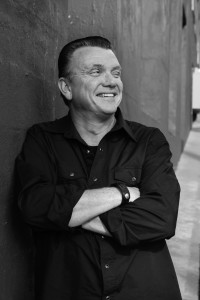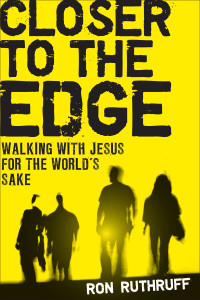Dr. Ron Ruthruff, Associate Professor of Theology & Culture at The Seattle School, has released his second book, Closer to the Edge: Walking with Jesus for the World’s Sake. In the book, Ron wonders how the world’s perceptions of Christians—and, therefore, its perception of Christ—might change if our way of doing justice work is as important as the end result. “The way you treat the person you love the least is the way you love God the most,” says Ron. Here, we’re featuring a conversation with Ron about the themes of the book and his hopes about the impact it will have on readers. You can also read an excerpt from the book’s introduction on our blog, and you’re invited to a special book release celebration, December 5 at The Seattle School, featuring a conversation between Ron and Dr. Chelle Stearns, Associate Professor of Theology.
 First of all, congratulations! This is your second book, and it feels like quite an accomplishment to have both of these out in the world.
First of all, congratulations! This is your second book, and it feels like quite an accomplishment to have both of these out in the world.
You know, before The Least of These, I never planned on writing a book—especially after I finished my dissertation. I felt so called and compelled to finish that, but at no point did I think about publishing. I never thought I’d write one book, let alone two. I feel like a practical theologian who wants to preach and talk to people about what it means to follow Jesus in the world. That’s what I’m asking in this book: What does it mean to be a Christian in the world?
How do you go about addressing that question?
I start with my experience of being sent into hard places, then I try to offer some ideas that feel like actions we can all participate in. But I try to never remove those ideas too far from my own life.
Which means that, in your writing, you use a lot of narrative. Why is storytelling important to you?
I’d love to say it’s because Jesus did it. But, too, I think it’s because when we tell stories, we invite people into a place where they can identify with any character, or with multiple characters. Like in the Good Samaritan—if I’m totally honest, I probably see myself in every role except the Good Samaritan. I think it’s important to be able to identify with multiple characters, especially if they aren’t flat or one-dimensional.
My mother was a storyteller, so I became a storyteller through genetics. And I love it—I love telling stories.
So to go from not wanting to write a book at all to, now, releasing your second book—what changed?
For the first book, I was asked to write about how to work with street kids. I thought, “I don’t think I can write that book. But I can write about what young people on the street have taught me.” This time, I was asked if I would write a book on justice. I said, “I don’t know if I want to write a book on the ‘what’ of justice, but I sure would like to write a book about the how.” How do we go about being Christians in the world? What does it mean to love the world to death?
In Advanced Reading Seminar, we’re reading through David Bosch’s book Transforming Mission, and there’s a brilliant quote: “In the final analysis it was not the miracles of itinerant evangelists and wandering monks that impressed the populace—miracle workers were a familiar phenomenon in the ancient world—but the exemplary lives of ordinary Christians.” As I think about this new book, I want people to know that they’re loved. I want my neighbors to know that they’re loved. I want the world to know. If I love you and you don’t do what I want, do I still love you? I think yes—I think that’s what it means to follow Jesus. And that feels really risky. It feels vulnerable, and it feels transformational.
If I love you and you don’t do what I want, do I still love you?
A lot of us can resonate with the idea that living radically loving, open lives—engaging humanity in all of its suffering and brokenness—feels risky. What do you think it is that scares us so much?
I think the real avoidance of human suffering is about the powerlessness that comes with it. But I’d argue that the powerlessness I feel as I enter into other people’s suffering is part of the work of justice. It levels the playing field and makes me just as human as the person I want to advocate for. And that sucks. That I’m human, that I can be with somebody in not knowing, it’s a really powerful idea, but it can feel disempowering. Because all I can be is human.
 But what happens when the need feels too overwhelming, when whatever humanity we can offer seems like not nearly enough?
But what happens when the need feels too overwhelming, when whatever humanity we can offer seems like not nearly enough?
I lean heavily on Kathleen O’Connor’s work, Lamentations and the Tears of the World. We’re supposed to do good in the world, but what does it mean when all I can do is cry? O’Connor writes about why lament is so powerful—not a resignation to evil, but a demand that says it’s not supposed to be this way. There’s no better response to evil than to be with powerless people in powerless times and say it’s not supposed to be that way.
There’s something freeing in that. Like we’re not going for results or success in the way we usually think of it.
William Willimon makes a comment about the Sermon on the Mount, that it’s not because you’ll get better results, but because it’s the way of Jesus. It’s not outcome-based. Turning the other cheek doesn’t stop somebody from hitting you. Sometimes we go, “If I do good in the world, better things will happen.” No—you do good because it’s the ethics of Jesus, regardless of the outcome.
It seems like the personal work, growing into a place where you’re able to offer that, is pretty crucial.
There’s this metaphor in scripture about wilderness, exile, desert. In order for folks to move on from unjust situations, not only do we have to make corporate decisions that are hard, people have to make individual decisions that are hard. It’s that old phrase: you can’t take anybody where you aren’t willing to go. We need to understand that the places of wilderness in our own lives are really important. There’s something individually transformative about justice. If you’re asking people to step into something that’s unfamiliar, you have to be willing to step into the unfamiliar yourself.
The places of wilderness in our own lives are really important.
Lament, wilderness, exile, hard decisions—this is pretty heavy territory. What keeps you going?
This might be a ridiculous belief in the world today, but I still believe in the resurrection. I don’t believe it in a way that pushes me into the sweet hereafter, I believe it in a way that pushes me back into the world. I think that’s where this whole idea of Closer to the Edge came from. I can hold this life far more loosely than I thought I could if I believe in resurrection. If I gamble on the story of God being true, I can live differently in the world: I can forgive, I can lament, I can sit with people who are suffering, in a very different way if I truly believe that God redeems all things.
So my wish, what I want people to do, is I want us to be a little less afraid. I think most of the behaviors that the church has labeled as sin originate out of fear. So much of the world, so much of our behaviors, is about fear—I’m afraid I’m getting old, I’m afraid there’s not gonna be enough, I’m afraid of exposing myself. I’d like to be less afraid.
If I gamble on the story of God being true, I can live differently in the world.
That would make for a really compelling way of living. How do we get there?
There’s a lot we can learn in how we define the miraculous, and how we define being human. What I find to be so amazing is that the same God, who I truly believe does what we would call miracles, allows people to still love people, and live life to the fullest, in the face of death. That feels miraculous. Being with people in that, watching them do justice in the world, is transformational for both of us.
So often in “missions” work, we begin to understand how complex the world is, and we panic and feel like we can’t do anything. No—we can slow down, ask better questions, find conversation partners. We as North Americans often start our ways of doing justice in the world with, “We do know, and we can help.” If we start from “I don’t know, and I can’t help,” imagine how powerful the collaboration can be with others around the world. I think that’s the start of great work in the world: getting together and throwing all our assets on the table.
You use that metaphor of the table in your book, too. Can you say more about that?
There’s a chapter called “Setting a Bigger Table,” and I think that’s the crux of the conflict right now in the Christian community. Who gets to be the guest? Who gets to be the host? How many people get to sit at the table? When we really begin to question who gets invited and who calls the shots, things change.
That’s my hope in all this—that we continue to talk honestly across a whole bunch of lines about what it means to be a Christian in the world.
Tickets for the December 5 book release event include a signed copy of Closer to the Edge. Learn more and register here.

